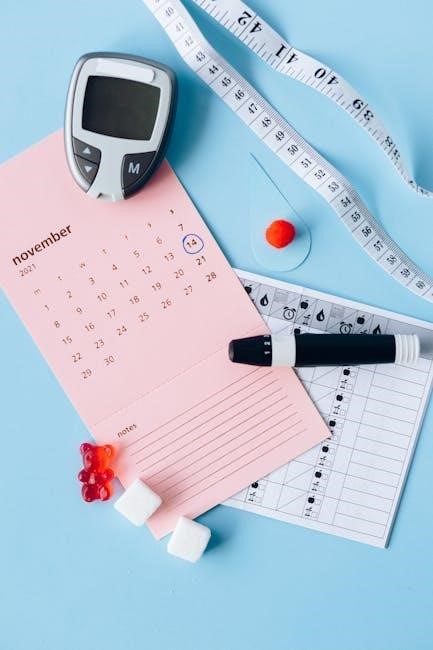Diabetes sick day management is crucial when illness strikes, as it helps maintain blood sugar control and prevents complications. Understanding how sickness affects glucose levels is key to implementing effective care strategies and ensuring overall health during recovery.
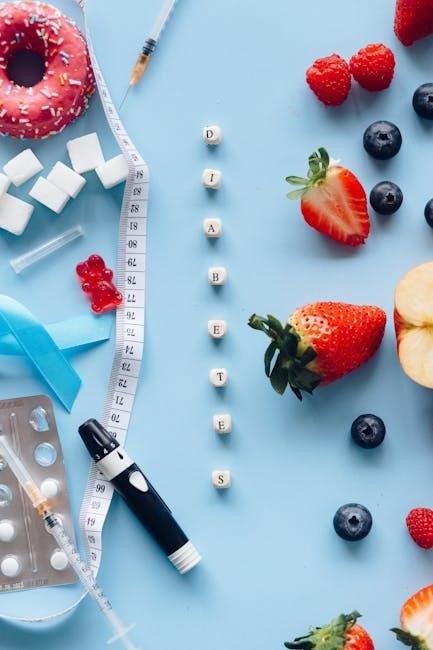
1.1 Understanding the Impact of Illness on Diabetes
Illness can significantly disrupt blood sugar levels due to stress hormones like cortisol, which raise glucose. Even minor illnesses, such as the flu or colds, can cause blood sugar fluctuations. Without proper management, high blood glucose levels may lead to complications like diabetic ketoacidosis, especially in type 1 diabetes. Monitoring and adjusting diabetes care during sickness is vital to prevent these risks and ensure recovery.
1.2 Key Principles of Sick Day Guidelines
Key principles include frequent blood glucose checks, adjusting insulin doses, and staying hydrated. Monitoring ketones is crucial when blood sugar exceeds 250 mg/dl, especially for type 1 diabetes. Maintaining nutrition with carbohydrates and avoiding medication skips are vital. Having a pre-planned emergency kit and clear communication with healthcare providers ensure timely interventions and prevent complications during illness.
Preparation for Sick Days
Preparation involves stockpiling diabetes supplies, medications, and non-perishable foods. Store insulin, testing kits, and emergency contacts safely. A sick day kit ensures readiness to manage glucose fluctuations and prevent complications during illness effectively.
2.1 Essential Supplies to Have on Hand
Stockpile essential supplies like insulin, glucose meters, test strips, and ketone test kits. Keep non-perishable carbohydrates, oral rehydration solutions, and medications on hand. Ensure a sufficient supply of syringes, needles, and alcohol swabs. Store emergency contact information and a copy of your diabetes management plan. Having these items ready helps maintain control and prevents complications during illness.
2.2 Creating a Sick Day Emergency Plan
A sick day emergency plan should include a list of emergency contacts, such as your healthcare provider and diabetes educator. Keep a copy of your medication list and dosages. Outline steps for managing high blood sugar, checking ketones, and hydration. Include a plan for when to seek medical help. Store this plan in an easily accessible location and review it annually to ensure it remains relevant and effective.

Monitoring Blood Sugar and Ketones
Regular blood glucose checks and ketone monitoring are vital during illness to prevent complications. High blood sugar levels can lead to ketoacidosis, especially in type 1 diabetes.
3.1 Frequency of Blood Glucose Checks During Illness
During illness, blood glucose levels should be checked more frequently to manage fluctuations. For minor illnesses, check every 6 hours, and for severe illnesses, monitor every 2-3 hours. High blood sugar levels can lead to complications like diabetic ketoacidosis, especially in type 1 diabetes. Regular monitoring ensures timely adjustments to medication and helps prevent severe complications.
3.2 When and How to Check for Ketones
Check for ketones if blood glucose exceeds 250 mg/dl, especially with type 1 diabetes. Use urine ketone strips or a meter for accuracy. High ketone levels indicate potential diabetic ketoacidosis, requiring immediate medical attention. Stay hydrated and adjust insulin doses as advised. Regular ketone monitoring during illness helps prevent severe complications and ensures timely intervention. Always follow your healthcare provider’s specific guidelines for ketone testing.
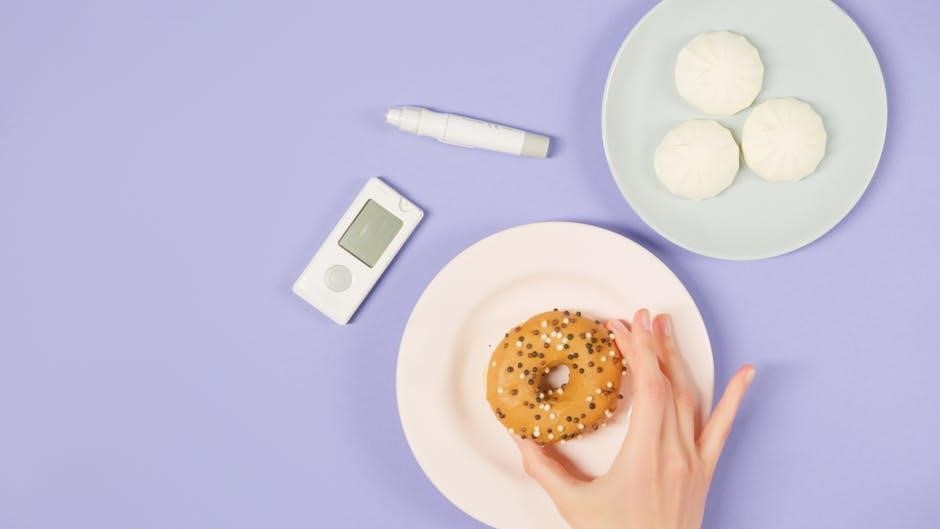
Adjusting Diabetes Medications
Adjusting diabetes medications during illness is vital. Insulin doses may need modification, and oral medications should continue unless advised otherwise. Never skip insulin, as it’s crucial for glucose control. Adjustments help prevent complications and ensure recovery. Always follow your personalized sick day plan.
4.1 Insulin Dose Adjustments During Sick Days
During illness, insulin doses may need adjustment based on blood glucose levels and ketone checks. If blood glucose exceeds 240 mg/dl, additional insulin may be required. Always consult your healthcare team for guidance. Even if eating is challenging, insulin should not be skipped, as it’s essential for glucose control. Small, frequent doses may be recommended to manage spikes and prevent complications.
4.2 Managing Oral Diabetes Medications When Sick
During illness, oral diabetes medications should be continued as prescribed unless advised otherwise by your healthcare team. If blood glucose levels drop or you experience symptoms of hypoglycemia, medications may need temporary adjustment. Always monitor blood sugar closely and stay hydrated. Consult your care team for specific guidance, especially if eating is challenging or if medications need to be paused to avoid hypoglycemia.
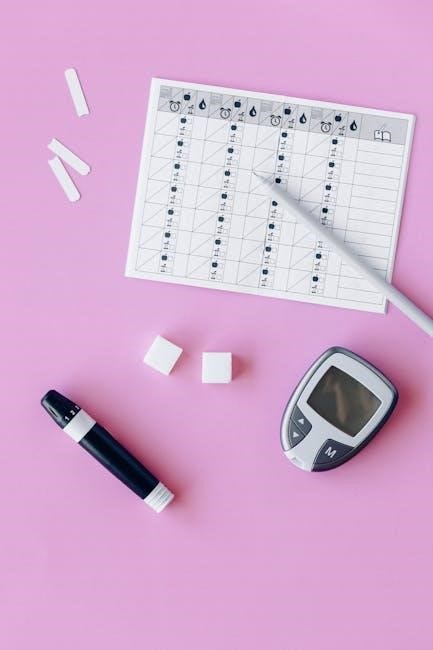
Nutrition and Hydration During Illness
Nutrition and hydration are vital during illness to maintain energy and blood sugar balance. Check blood sugar levels regularly and adjust medications as guided by your healthcare team. Log blood sugar levels and stay hydrated to support recovery and overall health.
5.1 Carbohydrate Intake and Sick Day Nutrition
Managing carbohydrate intake is essential during illness to maintain stable blood sugar levels. Opt for easy-to-digest, low-sugar foods like crackers, toast, or broth. Monitor blood glucose regularly and adjust medications as needed. Aim for small, frequent meals to avoid spikes or drops in blood sugar. Keep a log of food intake and blood sugar levels to guide adjustments in your nutrition plan effectively.
5.2 Importance of Staying Hydrated
Staying hydrated is vital during illness to prevent dehydration and manage blood sugar levels. Drink at least 6-8 ounces of fluid hourly, focusing on water, clear broths, or sugar-free beverages. Avoid sugary drinks that can spike blood sugar. Proper hydration helps regulate glucose levels and reduces the risk of complications like ketoacidosis, especially in Type 1 diabetes. Dehydration can worsen hyperglycemia, so consistent fluid intake is essential for recovery and stability.

Recognizing and Managing Emergency Symptoms
Recognizing emergency symptoms like severe hyperglycemia or hypoglycemia is critical. Symptoms include confusion, dizziness, or vomiting. Seek immediate medical help if symptoms worsen or cannot be managed at home.
6.1 Identifying High and Low Blood Sugar Symptoms
High blood sugar symptoms include thirst, frequent urination, and confusion, while low blood sugar causes dizziness, nausea, and vomiting. Monitoring these signs is crucial for timely intervention. Severe symptoms, such as loss of consciousness, require immediate medical attention. Recognizing these indicators helps prevent complications and ensures proper management during illness.
6.2 Knowing When to Seek Immediate Medical Help
Seek immediate medical help if blood glucose exceeds 250 mg/dl with ketones, or if symptoms like confusion, loss of consciousness, or severe nausea occur. Persistent vomiting, rapid breathing, or fruity breath odor (a sign of ketones) also require urgent care. If symptoms worsen or blood sugar remains uncontrolled, don’t delay seeking professional help to prevent complications like diabetic ketoacidosis or severe hypoglycemia.
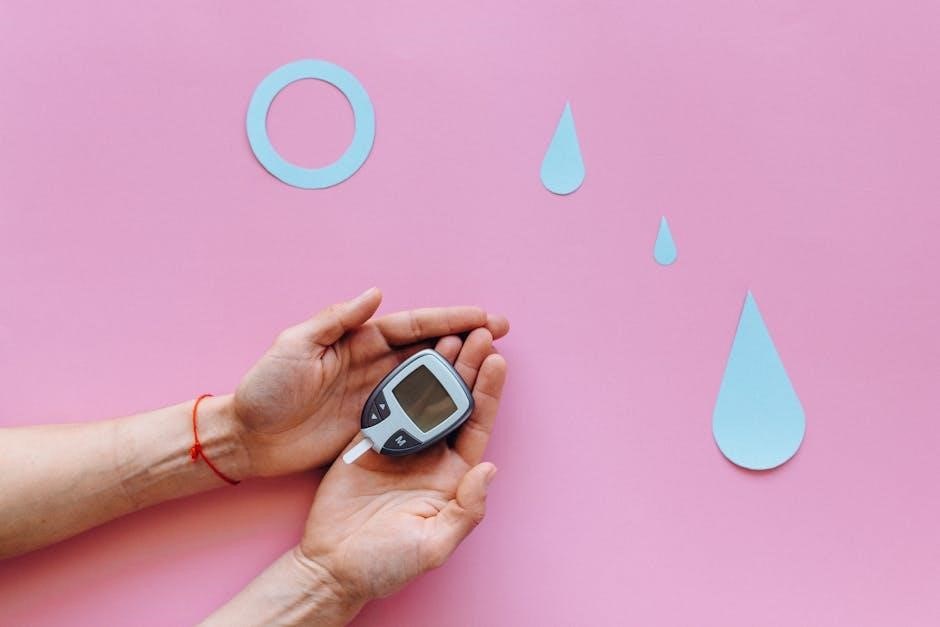
Recovery and Resuming Normal Routine
After illness, gradually resume normal routines, monitoring blood sugar and adjusting medications as needed. Stay hydrated and consult healthcare professionals for personalized guidance during recovery.
7.1 Gradually Returning to Regular Diabetes Management
After recovery, resume normal diabetes routines gradually. Monitor blood sugar levels closely and adjust medications as prescribed. Stay hydrated and reintroduce regular meals cautiously. Consult your healthcare team for personalized advice to ensure a smooth transition back to usual care.
7.2 Adjusting Medications Post-Recovery
After recovering, gradually resume your normal medication routine. Consult your healthcare team for guidance on adjusting doses, especially if blood sugar levels were unstable during illness. Restart insulin or oral medications as advised, ensuring proper blood sugar monitoring. Any changes should align with your recovery progress to avoid complications and maintain stable glucose levels.
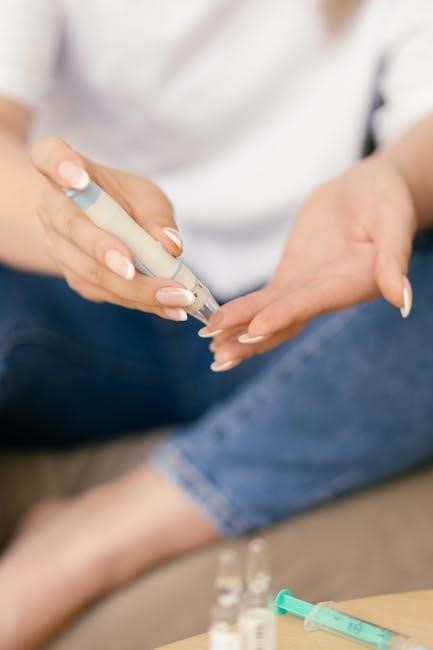
Additional Considerations for Specific Diabetes Types
Management strategies vary for Type 1 and Type 2 diabetes during sick days, requiring tailored approaches to medication, monitoring, and hydration to meet individual needs effectively.
8.1 Sick Day Management for Type 1 Diabetes
For individuals with Type 1 diabetes, sick day management requires close monitoring of blood sugar levels, typically every 2-3 hours during severe illness. Testing for ketones is crucial when blood glucose exceeds 250 mg/dl to prevent diabetic ketoacidosis (DKA). Insulin doses may need adjustment based on glucose levels and food intake, but insulin should never be skipped. Stay hydrated, and consult your healthcare team for personalized guidance to ensure safe and effective management during illness.
8.2 Special Considerations for Type 2 Diabetes
For Type 2 diabetes, sick day management focuses on monitoring blood sugar levels, adjusting oral medications as needed, and staying hydrated. Illness can increase blood glucose, so regular checks are essential. Some medications may need temporary adjustment or cessation under medical guidance. Eating small, easily digestible meals and maintaining fluid intake helps manage symptoms. Consult your healthcare provider for personalized advice to avoid complications and ensure safe recovery.
Creating a Personalized Sick Day Plan

A personalized sick day plan involves tailoring guidelines to individual needs, ensuring essential supplies and emergency contacts are ready, and adapting strategies based on personal health status.
9.1 Tailoring Guidelines to Individual Needs
Tailoring sick day guidelines involves adjusting strategies based on personal health status, medication types, and lifestyle. This ensures that the plan addresses specific needs, such as insulin requirements or dietary preferences, making it more effective during illness. Regular consultation with a healthcare team helps refine the plan, ensuring it remains relevant and adaptable to changing circumstances and health conditions.
9.2 Involving Your Healthcare Team
Involving your healthcare team is vital for effective sick day management. They provide personalized advice, adjust medications, and help monitor blood sugar levels. Regular communication ensures tailored strategies, preventing complications and promoting recovery. Their expertise supports creating a plan that aligns with individual needs, enhancing overall diabetes care during illness.

Important Resources and References
Key resources include the Joslin Diabetes Center’s sick day guidelines and ADA’s comprehensive guides. These materials provide detailed strategies for managing diabetes during illness.
10.1 Recommended Reading and Guides
Key resources include the Joslin Diabetes Center’s sick day guidelines and ADA’s comprehensive guides. These materials provide detailed strategies for managing diabetes during illness, including blood glucose monitoring, insulin adjustments, and medication management. Additional tools like log sheets for tracking and emergency plans are also available, offering practical support for effective sick day management and preventing complications.
10.2 Online Tools for Sick Day Management
Utilize online tools like blood sugar tracking apps and medication reminders to monitor and manage diabetes during illness. Platforms offer customizable logs for recording glucose levels and ketone tests. Educational websites provide step-by-step guides for adjusting insulin doses and recognizing emergency symptoms. These digital resources empower individuals to stay proactive and informed, ensuring better health outcomes during sick days.
Effective diabetes sick day management ensures better health outcomes, preventing complications and promoting recovery. Proactive planning and adherence to guidelines empower individuals to manage diabetes confidently during illness.
11.1 Summary of Key Takeaways
Effective diabetes sick day management involves preparing supplies, monitoring blood sugar and ketones, adjusting medications, staying hydrated, and recognizing emergency symptoms. Regular checks and maintaining communication with healthcare providers are essential. Personalized plans and proactive strategies help prevent complications and ensure a smooth recovery. By following these guidelines, individuals with diabetes can manage their condition confidently during illness and maintain overall health.
11.2 Final Tips for Effective Sick Day Management
To manage diabetes effectively during sickness, monitor blood sugar levels closely, stay hydrated, and adjust insulin doses as needed. Keep emergency supplies ready and communicate with your healthcare team regularly. Prioritizing these steps can help prevent complications and ensure a quicker recovery. Always follow your personalized plan and seek medical help if symptoms worsen or ketones are present.
